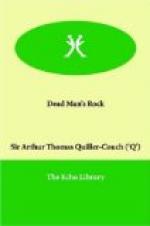Presently I heard his spade strike against something hard. Surely he had not yet dug deeply enough. The clasp had said “four feet six inches,” and the pit could not yet be more than three feet in depth. Colliver bent down and drew something out, then examined it intently. As I strained forward to look, he half turned, and I saw between his hands—a human skull. Whose? Doubtless, some victim’s of those many that went down in the Belle Fortune; or perhaps the skull of John Railton, sunk here above the treasure to gain which he had taken the lives of other men and lost in the end his own. It was a grisly thought, but apparently troubled Colliver little, for with a jerk of his arm he sent it bowling down the sands towards the breakers. A bound or two, a splash, and it was swallowed up once more by the insatiate sea.
With this he fell to digging anew, and I to watching. For a full twenty minutes he laboured, flinging out the sand to right and left, and every now and then stopping for a moment to measure his progress. By this time, I judged, he must have dug below the depth pointed out upon the clasp, for once or twice he drew it out and paused in his work to consult it.
He was just resuming, after one of these rests, when his spade grated against something. He bent low to examine it, and then began to shovel out the sand with inconceivable rapidity.
The treasure was found!
Like a madman he worked: so that even from where I stood I could hear his breath coming hard and fast. At length, with one last glance around, he knelt down and disappeared from my view. My time was come.
Knife in hand, I softly clambered down the south side of the rock, and dropped upon the sand.
The pit lay rather to the north, so that by creeping behind the ridge on the south side I could get close up to him unobserved, even should he look. But he was absorbed now in his prize, so that I stole noiselessly out across the strip of sand between us until within about ten feet of him; then, on hands and knees, I crawled and pulled myself to the trench’s lip and peered over.
There, below me, within grasp, he sat, his back still turned towards me. The moon was full in front, so that it cast no shadow of me across him. There he sat, and in front of him lay, imbedded in the sand, a huge iron chest, bound round with a broad band of iron, and secured with an enormous padlock. On the rusty top I could even trace the rudely-cut initials A. T.
I held my breath as he drew from his pocket my grandfather’s key and inserted it in the lock, after first carefully clearing away the sand. The stubborn lock creaked heavily as at last and with difficulty he managed to turn the key. And still I knelt above him, knife in hand.
Then, with a long, shuddering sigh, he lifted and threw back the groaning lid. We both gazed, and as we gazed were well-nigh blinded.




